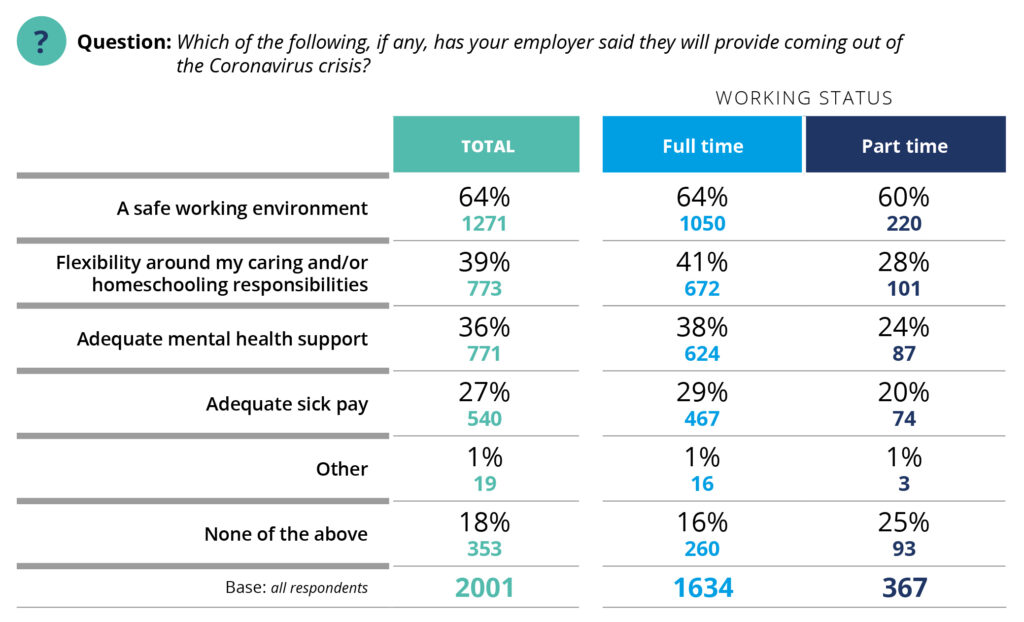Fears over mental health and sick pay support post lockdown
A nationwide survey of UK workers commissioned by business ethics specialists GoodCorporation has revealed that mental health may go unsupported by employers as the nation comes out of lockdown. Just over a third[1] of employees (36%) believe that their employer will provide adequate mental health support as we continue to adapt to working through the crisis. For employees in the private sector, this falls to just 29 per cent. This compares to 45 per cent of employees in the public sector who feel that adequate mental support will be provided by their employer.


Manual workers in particular feel that any mental health needs will go unsupported. Just 16% of manual workers feel this would get adequate support. This contrasts significantly with workers at middle management or above; over 46 per cent of workers in this group felt that mental health support would be adequate.
Women were also less likely to feel that they would receive sufficient mental health support than men (31% vs 39% for men). Commenting on this finding, GoodCorporation director Debbie Ramsay said, “With mental health charity Mind declaring the pandemic to be as much a mental health emergency as a physical health emergency it is vital that employers recognise the potential impact of the virus on employees’ mental health. This is particularly important in the private sector which currently lags behind the public sector in terms of mental health provision.
“The pandemic has heightened awareness of how businesses treat their employees. Good organisations will be sensitive to mental health issues and recognise that additional support may be needed. From these findings we can see that more needs to be done.”
Sick pay
Sick pay was also a cause for concern. A little over a quarter (27%) feel that sick pay will be adequate as we move through the crisis. The findings are even more worrying for manual workers. Just 15% believe that sick pay will be sufficient as businesses strive to get back to some form of normal. As with mental health support, fewer women were likely to feel that sick pay would be adequate post lockdown. Just under a quarter (24%) of women found this would be adequate compared to 30% of men.
Ramsay added, “Ensuring that all workers can afford to isolate if required to do so by the track and trace scheme is essential to its success. Inadequate sick pay could well deter individuals from complying with the scheme and so contribute to the ongoing spread of the virus. Government and employers need to work together to ensure that individuals do not suffer financially as a result of following the necessary steps to limit transmission of the virus. “
Additional findings
The survey also highlighted concerns around employer flexibility for any caring and home-schooling responsibilities. Only 39 per cent of employees stated that their employer would provide the necessary accommodations for such non-work obligations.
Excessive working hours have also been a problem for some UK workers, particularly those living in London. 63 per cent of Londoners had been asked to work excessive hours. This is more than double the national rate of 30 per cent. Age and gender were also a factor in the demands to work excessive hours. Almost half of 18-24 year olds asked to put in extra hours over the last four months. On the gender front, men were much more likely to be asked to burn the midnight oil than women (38% vs 22%).
Working while furloughed
The findings around working while furloughed were worrying. Twenty eight per cent of workers for organisations operating in the public sector had been asked to work while furloughed. This is illegal. It is also a possible abuse of public funds by companies working in the public sector and may also go against the Government’s own guidance on furloughing.
Business size also made a difference. Eleven per cent of workers in large organisations were (+5,000 employees) asked to work while furloughed. This compared to 36% of workers in medium sized operations (250- 1,000 employees). These findings suggest that there is widespread abuse of the furlough scheme. This applies even among large organisations with access to human resources and legal teams who should be providing guidance on the correct implementation of the worker retention scheme.
[1] Research conducted for GoodCorporation by Opinium Research from 10-20th July 2020 of 2001 working adults in the UK. Sample designed to be representative of the UK working population. Research conducted by email survey using Opinium’s omnibus panel. The population for this research is the UK working population. This is estimated by the UK government to be circa 28,000,000 in employment. The overall analysis has a 95% confidence level and +/-2% confidence interval some of the sub-data has a wider confidence interval and this is noted in footnotes where applicable
